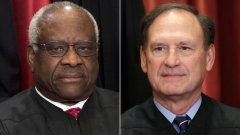
Supreme Court Justices Clarence Thomas, left, and Samuel Alito. (Getty Images)
(CNS News) — In Justice Clarence Thomas and Justice Samuel Alito’s statement on Monday (written by Thomas) about the court’s 2015 decision to legalize so-called gay marriage, the justices argued that the case, Obergefell v. Hodges, “threaten[s] the religious liberty of the many Americans who believe that marriage is a sacred institution between one man and one woman.
Their statement came with the Court’s rejection of certiorari, or their refusal to hear the case, for Kim Davis, a Kentucky county clerk who refused to give David Ermold a wedding license for him and his partner David Moore.
Rowan County, Ky., clerk Kim Davis. (Getty Images)
Davis was jailed briefly for contempt of court, and was sued for damages by Ermold and another couple. Her petition for review by the Supreme Court was denied on Monday, upholding the Sixth circuit’s ruling against Davis.
In their statement, Alito and Thomas agree with the denial of certiorari but use the opportunity to point out flaws with the ruling that started the conflict: Obergefell v. Hodges.
Obergefell was decided in 2015 in a 5-4 decision, with Justice Anthony Kennedy delivering the majority opinion. Justices John Roberts, Antonin Scalia, Samuel Alito, and Clarence Thomas dissented. The Court decided that the 14th Amendment requires marriage licensing and recognition for same-sex couples.
(Getty Images)
The five main takeaways from Thomas and Alito are,
1. Obergefell created “atexual” rights “undemocratically.”
“In Obergefell v. Hodges, the Court read a right to same-sex marriage into the Fourteenth Amendment, even though that right is found nowhere in the text,” Thomas wrote of the decision.
Thomas believes that this ruling, decided by one body, bypassed the democratic process the legislation of this kind demands.
“It would be one thing if recognition for same-sex marriage had been debated and adopted through the democratic process, with the people deciding not to provide statutory protections for religious liberty under state law,” he wrote. “But it is quite another when the Court forces that choice upon society through its creation of atextual constitutional rights.”
2. Adjudicating Obergefell state by state, rather than by one body, would have allowed for greater protections for religious persons.
“If the States had been allowed to resolve this question through legislation, they could have included accommodations for those who hold these religious beliefs,” Thomas wrote. “The Court, however, bypassed that democratic process.”
“Its creation of atextual constitutional rights and its ungenerous interpretation of the Free Exercise Clause, [leaves] those with religious objections in the lurch,” he said.
The Free Exercise Clause of the First Amendment prohibits Congress from making laws that proscribe certain religious practices.
(Getty Images)
3. Obergefell uses demonizing language.
“Though [Obergefell] briefly acknowledged that those with sincerely held religious objections to same-sex marriage are often ‘decent and honorable,’ the Court went on to suggest that those beliefs espoused a bigoted worldview,” wrote Thomas.
The language used by the Court made dissenting justices fear for possible ramifications against religious people.
“Those predictions did not take long to become reality,” Thomas wrote. “Those with sincerely held religious beliefs concerning marriage will find it increasingly difficult to participate in society without running afoul of Obergefell.”
“Obergefell enables courts and governments to brand religious adherents who believe that marriage is between one man and one woman as bigots, making their religious liberty concerns that much easier to dismiss,” he wrote.
(Getty Images)
4. Davis will be the first of many religious persons that fall “victim” to Obergefell.
Thomas described sympathetically the position of the county clerk, Kim Davis, although he agreed not to hear her case.
“Davis is also a devout Christian,” said Thomas. “When she began her tenure as clerk, Davis’ sincerely held religious beliefs—that marriage exists between one man and one woman—corresponded with the definition of marriage under Kentucky law.”
“Davis found herself faced with a choice between her religious beliefs and her job,” he said. “When she chose to follow her faith, and without any statutory protection of her religious beliefs, she was sued almost immediately for violating the constitutional rights of same-sex couples.”
Obergefell, according to the justices, allowed for a decision that “being a public official with traditional Christian values was legally tantamount to invidious discrimination toward homosexuals.
Thomas warned, “Davis may have been one of the first victims of this Court’s cavalier treatment of religion in its Obergefell decision, but she will not be the last.”
(Getty Images)
5. The Court needs to “fix” Obergefell.
“The Court has created a problem that only it can fix,” concluded Thomas. “Until then, Obergefell will continue to have ‘ruinous consequences for religious liberty.’”
With a potential 5-4 conservative majority on the bench following Judge Amy Coney Barrett’s pending confirmation hearing, Thomas and Alito’s words may be hinting at the Court reevaluating their decision in Obergefell.



